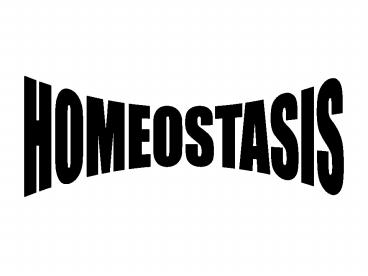HOMEOSTASIS - PowerPoint PPT Presentation
1 / 16
Title:
HOMEOSTASIS
Description:
Title: PowerPoint Presentation Author: user Last modified by: Emma Created Date: 5/18/2004 1:57:57 PM Document presentation format: On-screen Show (4:3) – PowerPoint PPT presentation
Number of Views:101
Avg rating:3.0/5.0
Title: HOMEOSTASIS
1
HOMEOSTASIS
2
Homeostasis
Maintenance of a constant internal environment
despite changes in external environment
3
- WHAT ARE THE MAIN HOMEOSTATIC SYSTEMS DISCUSSED?
- Blood pH
- Oxygen/Carbon Dioxide
- Body Temperature Control
- Electrolytes (blood sugar)
- Blood Pressure
4
- HOW DOES HOMEOSTASIS WORK?
- Homeostatic control systems detect stress or
change and act to maintain EQUILLIBRIUM - ?They have 3 functional components
- Sensors/Monitors (senses stress compared to a
SET POINT) - Coordinating centre
- Regulator/ Effector (produces change)
- ? There are two main systems (Negative and
Positive feedback)
5
Negative feedback mechanism
FEEDBACK!
Thermometer is the SENSOR that measures deviation
from set point
Thermostat turns the regulator OFF when set point
is achieved
Furnace and Air Conditioner are regulators which
respond
6
Thermoregulation in the Body
The Hypothalamus is a gland in the brain which
acts as our THERMOSTAT It detects body
temperatures outside the set range It activates
EFFECTORS using HORMONES to send the message
7
TEMPERATURE IN THE BODY Thermoregulation
Coordinating Centre
Sensors
Regulator
HYPOTHALAMUS (in brain) turns on COOLING system
FEEDBACK
8
TEMPERATURE IN THE BODY Thermoregulation
- Exercise
- We just looked at HEAT stress
- What would happen if COLD stress occurred?
- What would your sensors, coordinating centre and
regulators be? - What result do you expect?
- Explain how this is negative feedback
- CHECK YOUR ANSWERS BY READING P338
9
TEMPERATURE IN THE BODY Thermoregulation in the
COLD!
- Sensor Thermoreceptors in the skin detect
dropping temperatures - Coordinating Center Hypothalamus turns on
warming system - Regulators
- Blood vessels in the skin constrict (shrink)
decreasing blood flow to the skin, reducing heat
loss from the skin - Muscle cells contract
- Causes shivering
- Smooth muscle surrounding hair follicles causes
hair to stand on end (goosebumps!) - Result Body temperature goes up!
10
Goosebumps!
Traps in warm air! Useful to animals that have
thick coats of hair...
11
Net Result Homeostasis
12
Weird Body Quirks
- Brain freeze
- Ice cream headaches happen when something cold
touches nerves in the roof of the mouth,
triggering blood vessels in the front of your
head to constrict -- producing pain. Try this
quick pain relief trick Press your tongue to the
roof of your mouth to warm it up.
13
Less efficient homeostasis
- Ectotherms (a.k.a. cold-blooded organisms
must SEEK heat to be able to metabolize
14
Recall
- Negative Feedback
- Brings fluctuating internal conditions back to
NORMAL - Common for homeostasis
- Positive Feedback
- sends messages to INDUCE a change
- Not common
15
POSITIVE FEEDBACK
- AMPLIFICATION OF A SMALL EFFECT
- Rapid
- Less common than negative feedback
- e.g. hormones in birth wake up the contraction
process and stimulate other hormones to turn on
16
Feedback Loops
Figure 6-27 A positive feedback loop































